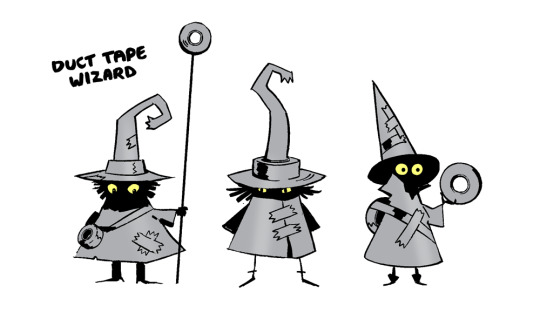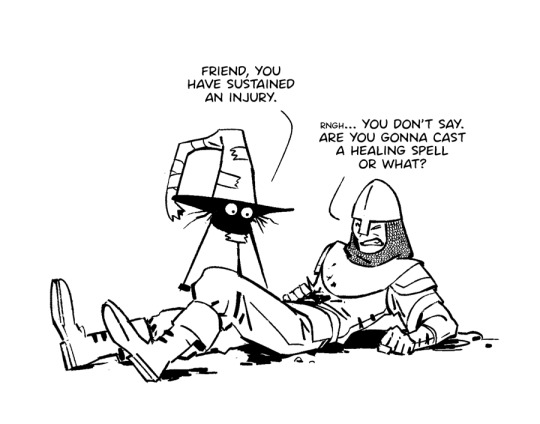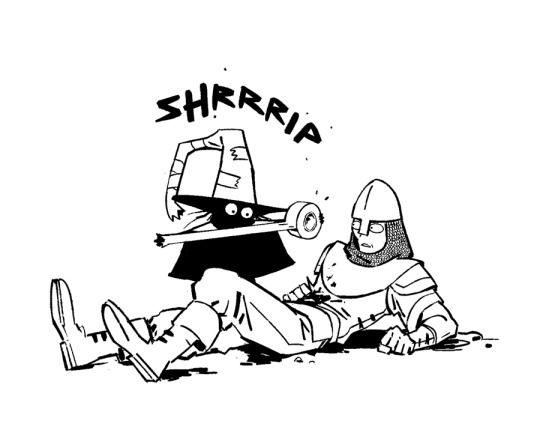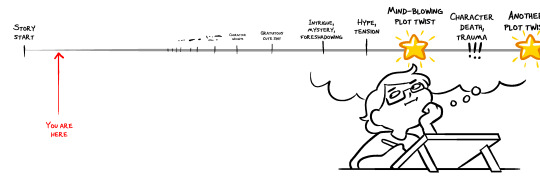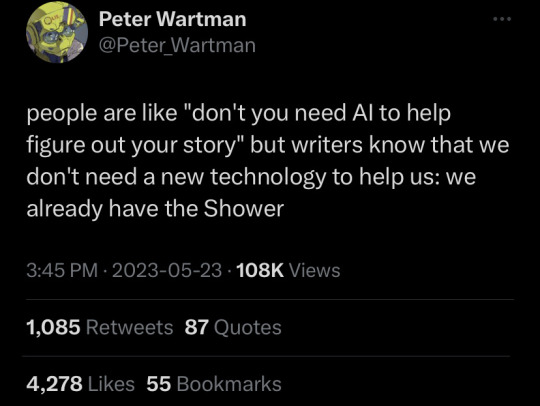Text
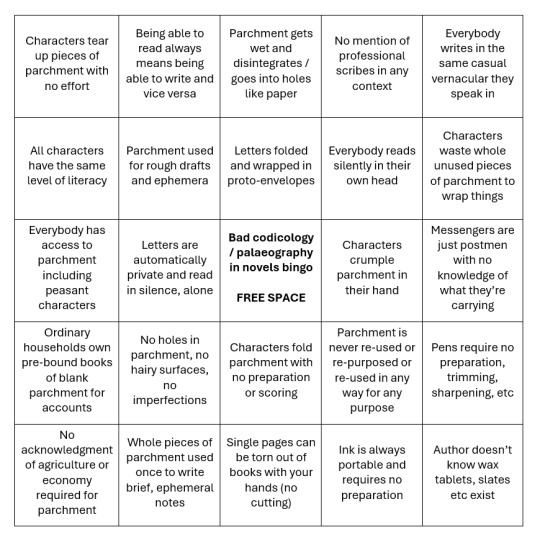
okay what did i miss
(yes some of these overlap and some are suppositions. for example if parchment is always used for ephemera, rough drafts, notes, and never re-used or re-purposed, we can also assume that the author is unaware of wax tablets as a concept)
4K notes
·
View notes
Text
why is the hardest part of doing a bibliography like. remembering the alphabet
75 notes
·
View notes
Text

shoutout to the "foolproof" bread recipe I fucked up entirely for inspiring this
16K notes
·
View notes
Text
“Oh you’re really into worldbuilding!”
“Yeah I watched every single one of the Lord of the Rings Extended Edition behind the scenes at a young age and it gave me high standards and now I’m trapped here.”
17 notes
·
View notes
Text
the funny thing is mira has conversations with delphene when it's just the two of them
like she's not just speaking to delphe, she's responding to her and they even have arguments
but we never hear delphe's thoughts and can only guess what they might be based on miras expressions and replies
(assuming that mira isn't just having imaginary conversations...)
several questions come up that I don't really have answers to
6 notes
·
View notes
Text
reblog this to remind the person you reblogged it from that theyre loved
48K notes
·
View notes
Text
There exist another dimension called The Empty World. It's very much like ours, in fact it seems to have been identical up until a few weeks ago, but it always seems that way. If you go there today, it was identical in late february, and if you go there this october, it'll have been identical until september.
It's empty, as you might guess. There's no humans, and no animals bigger than a cockroach. The sky is grey, and it slowly rains ash. It's colder than our world by a bit, enough to require a jacket even in summer. The streets are empty, the cars parked neatly in their garages or in lots, but they're all empty and abandoned, their doors locked like they expect their owners to return any minute now.
The newspapers left on stands don't mention any oncoming disaster. We have no idea what the TV or internet would have said: the power is out. The power is very, very out. Not just the grid, but batteries are drained. The cars won't start, the emergency lights are out, and anything with solar panels seems to be getting less energy than you'd expect, even with the perpetually overcast sky.
It's a very silent world, like the calm after a snowstorm. Sounds don't seem to echo as much as they should, nor does sound seem to travel as far. The radio spectrum is empty except for static, there's no one transmitting on any frequency.
There's fewer fires than you'd expect. Even places you'd expect to soon catch fire without human intervention are still standing, undamaged. Campfires can be lit but with difficulty: something is keeping them from burning as they should. Even if you pour kerosene on a campfire it'll barely grow, it's like something sucked the energy out of everything.
All the locked buildings are still locked. Alarms don't sound if you break in (understandable, given the power situation), and of course no one comes to investigate. So The Empty World is your oyster: you can break in wherever you want (provided you can physically do it: some doors are pretty hard to pry open even with tools), take whatever you want, and bring it back here.
Everything resets when you leave. You always enter The Empty World like it's your first time there, like this just happened and you're late to the party... but the party keeps getting rescheduled. You can even take something multiple times if you want.
When you enter The Empty World you get there at the same relative position as you are on this world. If you're in New York, you show up in the empty New York. If you're in Topeka, you show up in empty Topeka. So you have to travel around this world to get to where you want, and you can't just appear in the middle of a bank vault... unless you break into the vault from this world. (So it's great if you work at a bank and want to steal from your employer without repercussions, but not so useful otherwise).
You don't just have to take things, you know. You can take computers and files and books and diaries. You will have to deal with recharging laptops and breaking through any security when you get back, but it's doable.
So, imagine you've just gotten access to The Empty World. What are you going to do with it? What will you take, and where will you go?
4K notes
·
View notes
Text
the whiplash I just got
this whole Ambrose/Nat situation is gonna make me cry
14 notes
·
View notes
Note
🖍️
No one wants or asked for the trash dragon man, but I’ve got to draw him occasionally, in case I need him for something. 😅
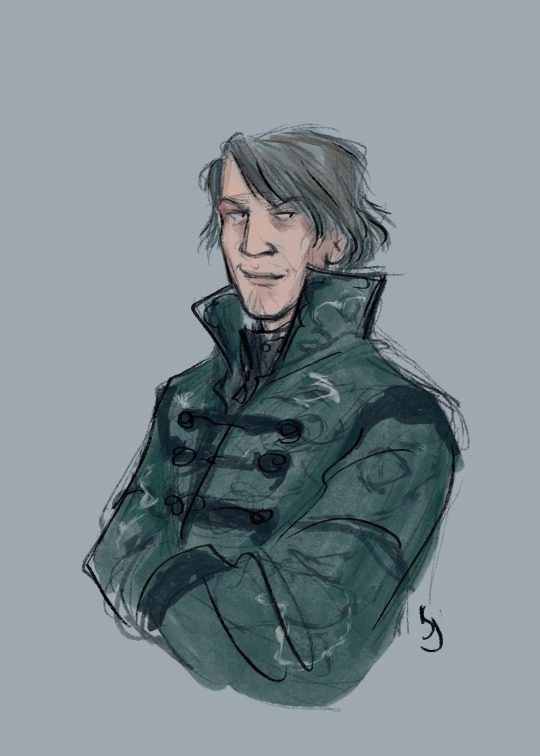
26 notes
·
View notes
Text
Dialogue Tags and Action Beats, Pacing and Scene Development; a Brief Overview
I've seen a few "dialogue tags to use instead of 'said'" posts now, but most of the tags provided by these posts are trying too hard and are much more distracting than "said" would be. "I'll kill you," he declared; "It's okay," she exonerated; He remarked, "He shouldn't have done that." These are clunky to varying degrees, and if you don't recognize that now, you will with practice.
The truth of the matter is that "said" is pretty much always blank space that the reader will skim over without a second thought. It's maybe the only word we have with this function, and it should be treated as such! So why don't we use dialogue tags that add meaning to the dialogue? Something like "argued," "rejoiced," "remarked"? You can, and these should be used now and then (maybe not "rejoiced"), but overusing them weights down the prose, and in general, they should be replaced by action beats or description.
In much the same way adverbs and adjectives should be avoided if the noun they modify already has the qualities of its modifier, wordy dialogue tags should be avoided if you can show the character's emotions through other means. Dialogue tags are telling; action beats and description are showing. Look at these examples:
He remarked, "I can't believe it's not butter."
His eyebrows rose. "I can't believe it's not butter."
"I told you not to do it," she cried.
Her body shook; words rasped her throat. "I told you not to do it."
"Cried" and "remarked" here aren't bad, but they are weaker than they could be. In the first example, "remarked" indicates tone, but it doesn't do anything else. "His eyebrows rose" indicates tone and also develops the scene. It places the character in the reader's mind's eye, and we understand how that specific character reacts to margarine. How would a different character react differently? This dialogue feels embodied; it belongs to a specific body, a specific host. The second example is embodied too, and a little flowery, though not excessively so. We see how a character reacts to whatever "it" is, and we aren't told how they react. How does she cry in the first sentence?
The debate about dialogue tags, however, misunderstands what tags are actually for. Probably 10% of it is imbuing meaning where there is none (a simple word like "whisper" is a great replacement for "said" when used with restraint), but 90% of it is about tempo/flow/beat/pacing/whatever you want to call it. Read these sentences:
She said, "This is none of your business, and you aren't telling anyone about it."
"This is none of your business," she said, "and you aren't telling anyone about it."
"This is none of your business, and you aren't telling anyone about it," she said.
These sentences convey the same information, but to the careful ear, they carry a world of difference. The first reads snippy, like a terse command; the second gives some added gravity to the second half of the quote, landing hard on the last clause; the third one may be effective if the character is responding immediately to something another character said, since there isn't anything to preface the dialogue, and there's nothing halting it in the middle. All this happens in the two syllables of "she said." Use this word to affect the flow of your writing; use this word to affect how people read your writing. Another sin of other dialogue tags is that they may have too high of a syllable count to warrant use. "He expostulated" is a wild distraction from otherwise smooth prose. "She interrupted" is also clunkier than just having the character interrupt with your choice of dialogue tag/action beat placement or omission. In general, I'd be wary of any dialogue tag longer than two syllables.
Wordy dialogue tags can also be avoided by seeding description in your conversation scenes! Just as the world still operates when we have conversations, so too should it for your characters. Here's an exchange from a story I wrote:
He smiled. “Sleep well?”
“Girls were up late.”
“Is that a yes—”
“No. I didn’t sleep.” She squeezed her eyes closed. “They were screeching.”
The crowd caught up with them, swallowed them, and they were carried along the cement.
“Oh.” Carmen paused. “Sorry.”
“It’s okay.”
“Is it all bad?”
Bodies shifted in the crowd, and Piper glimpsed Beatrice again. Familiarity warmed her chest. Here was the world outside the camp; here was everything Piper knew. She stood between Beatrice and Carmen and lived again in band class, lived again on the bus home, let public streams flood her roots and grow her as a social monolith, an independent and undisputed landmark in her social circles. But at camp, she was little more than Beatrice’s friend, than Carmen’s apocryphal lover. “It’s not all bad,” she said. “Bea is here. And you.”
Description can easily mold into a character's internal monologue, as it does here. You can also go straight to the monologue if you'd like:
Was she sad, Piper thought, or coy? No, it was the start of a joke. “You didn’t think you were a big deal?”
But Beatrice didn’t smile. “I didn’t think people cared that much.” She drew her hands close on the table, covered right with left, and looked into her knuckles. This was defeat, Piper recognized. Beatrice conceded, but of her own will. Piper won, but her score was sour, and Beatrice seemed to crumple her arms into the abject statue of her body.
And Piper felt as she never had before, as if a storm of locusts ate at the border of her stomach, as if her skin turned to deep and polluted waters, as if moving one hand or twitching one muscle would irrevocably alter the course of life; the drumming of a finger would set off some idle paranoia in Beatrice, or a sniff of the nose would throw her from the wide window, drop her thirty feet down the wooded hill, and crack herself in two on the base of an implacable oak. This was grief, Piper felt, or something approximating it, something resembling internally a dark and blank horizon, something feeling as a stone feels in a pond whose size may only house that stone, something taking shape in the woman before Piper, shrinking now to a girl, now to someone uninspiring in a world of couplets. Piper sat still, because she did not know how to affect the world without ending it. “I’m sorry,” she said.
Imagine if the second example read:
"You didn't think you were a big deal?" Piper said.
Beatrice frowned. "I didn't think people cared that much."
Piper frowned because Beatrice was sad. "I'm sorry."
Much weaker! Why is the description so long in the second example? Because it's a big emotion! In the world of pacing, big things get big descriptions. In both examples, you feel exactly what the characters are feeling, even though I never used a dialogue tag besides "said." And I used "said" a few times to affect the pacing, which adds to how you perceived the characters. You understood the characters because stronger, more descriptive, more pacing-aware things replaced what could've been clunky tags.
Still, you can do whatever you want with tags, beats, and description. I've read incredible prose with zero tags and sparse beats, prose with paragraphs of beats and plenty of tags, and anything in between. It's all a matter of style, which is to say, experiment! Writers will be stubborn and say things like, "I don't use anything besides 'said' in my prose" or "I'll never use 'said' in my prose again," but neither of those are your personal style. They're declarations that you'll die on this hill you don't fully comprehend, to take a stand on an idea you've never genuinely played with. Go full maximalist; go full minimalist; find what feels right for the pacing you want to incorporate into your style, and recognize how pacing changes depending on the context and content of a scene. Nearly every word is permissible somewhere, it's just a matter of finding the right scene for it. And "said" is permissible always.
297 notes
·
View notes
Note
I love her your honour
Hi glowstick
I'm hugging you! Which of your blorbos needs a hug the most, and will you give it to them?
sleepy <3 i'm hugging you right back!!
i think the blorbo that needs a hug the most is Mara from my current dragon wip. she's falsely imprisoned and is fighting to clear her name as well as stay alive. she has it so tough!
3 notes
·
View notes
Text
Tabletop RPGs should have more tutorial scenarios where you get to learn the game mechanics in a low-risk environment so that while you're actually learning the game mechanics your character is not at the risk of immediate death (unless lethality is very much a part of the game, in which case go for it)
674 notes
·
View notes
